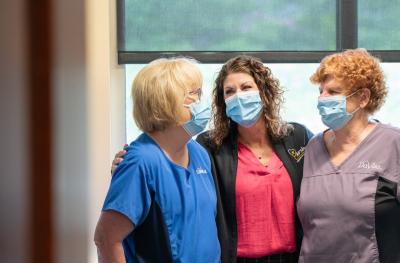
BY TINA LIVAUDAIS
Chief Nursing Officer for DaVita Kidney Care
I was drawn to nephrology early in my career because of the special connection these nurses are able to create with their patients. For me, in each person I cared for, I saw my grandmother who experienced kidney failure—and I cherished the relationships I could forge with patients in similar circumstances.
As time went on in a direct patient caregiving role, I challenged myself to think about my bigger picture. Many nurses, myself included, can forget to ask themselves, “what’s next for me,” because patients always come first. Making a meaningful difference in people’s lives is a foundational value in nursing; it’s our “why.”
The uncertain, high-pressure conditions health care workers have endured the last few years helped exacerbate this tunnel vision on patient care. Now that I lead nursing at DaVita, my goal is to reinforce, expand and introduce opportunities for learning, growth and fulfillment. Above all else, I strive to find answers to the question: With more nurses leaving the field and fewer people pursuing it as they enter the workforce, how do we support our nurses, bring in new nurses and create pathways of growth for current and prospective nurses?
As I reflect on my career, I realize this question isn’t new. But, I also recognize the impact the mentors in my life had on helping me find and take advantage of available pathways.
My nurse mentors reminded me to take care of myself as well as my patients. One in particular encouraged me to step back from the day-to-day and consider what I might want for my future. And when I wasn’t quite sure, she helped me find clarity and better understand my worth.
At one point, I wrestled with whether I wanted to pursue leadership opportunities at a national level or continue in a position closer to direct patient care. She and I both understood I wanted to grow, but staying close to the field fueled my passion. What I learned from her, though, was that I could ask for both. She helped me see the value I brought to the table and that I could forge my own path that combined what I loved to do and my desire to grow.
All of this self-reflection comes during a very special time. It’s National Nurses Appreciation Month—a celebration that was extended from a week to a month in 2020 to more fully recognize the contributions of nurses to the health care community. So this month, I celebrate not only the contributions nurses have made in the lives of their patients, but also the meaningful difference they make as mentors to one another.
| Through mentorship, nurses new to nephrology may experience less stress and less uncertainty—with the potential to decrease burnout. |
As the American Association of Colleges of Nursing (ANCC) defines it, mentoring creates a learning environment where more experienced, knowledgeable individuals facilitate learning, development and growth for people with less experience. In nephrology nursing, I believe mentorship is not just valuable; it’s essential.
New nurses who pursue careers in kidney care come to the table with limited education. Nursing schools spend little time on nephrology, with minimal instruction time dedicated to dialysis treatments and care for the complex needs kidney patients have. I hope that in the future, nursing students will have more robust exposure to kidney care during their education. But as we work toward that future, it’s critical to create environments that foster that learning and development.
This is the idea behind DaVita’s Nurse Residency Program. Nurses new in their careers can see the residency program as a bridge as they transition into practice, allowing them to apply the knowledge they gained in school and augment it with kidney-specific care information and instruction. By offering this bridge between formal education and on-the-job experience, the residency program, also known as Transition to Practice, helps cultivate an environment and culture of growth for teammates.
For the nurses reading this, thank you for all you do. As you think about the ways to find career fulfillment, I encourage you to take two actions:
- First, find a mentor. Find someone from whom you can learn. Yes, a mentor can help you advance the professional skills you employ every day, but they can also encourage you to take that step back and to ask yourself what you want from your career.
- Second, be a mentor. Look at the nurses new to your team and seek out ways to support them and help them grow with confidence. Discover ways to help the nurses you work with focus on their personal and professional well-being.
Fostering this culture helps ensure the nurses in our communities feel fulfilled in their careers as they stretch the boundaries of what they think they can do, set and achieve new goals and feel fulfilled while doing what nurses do best: care for patients.









